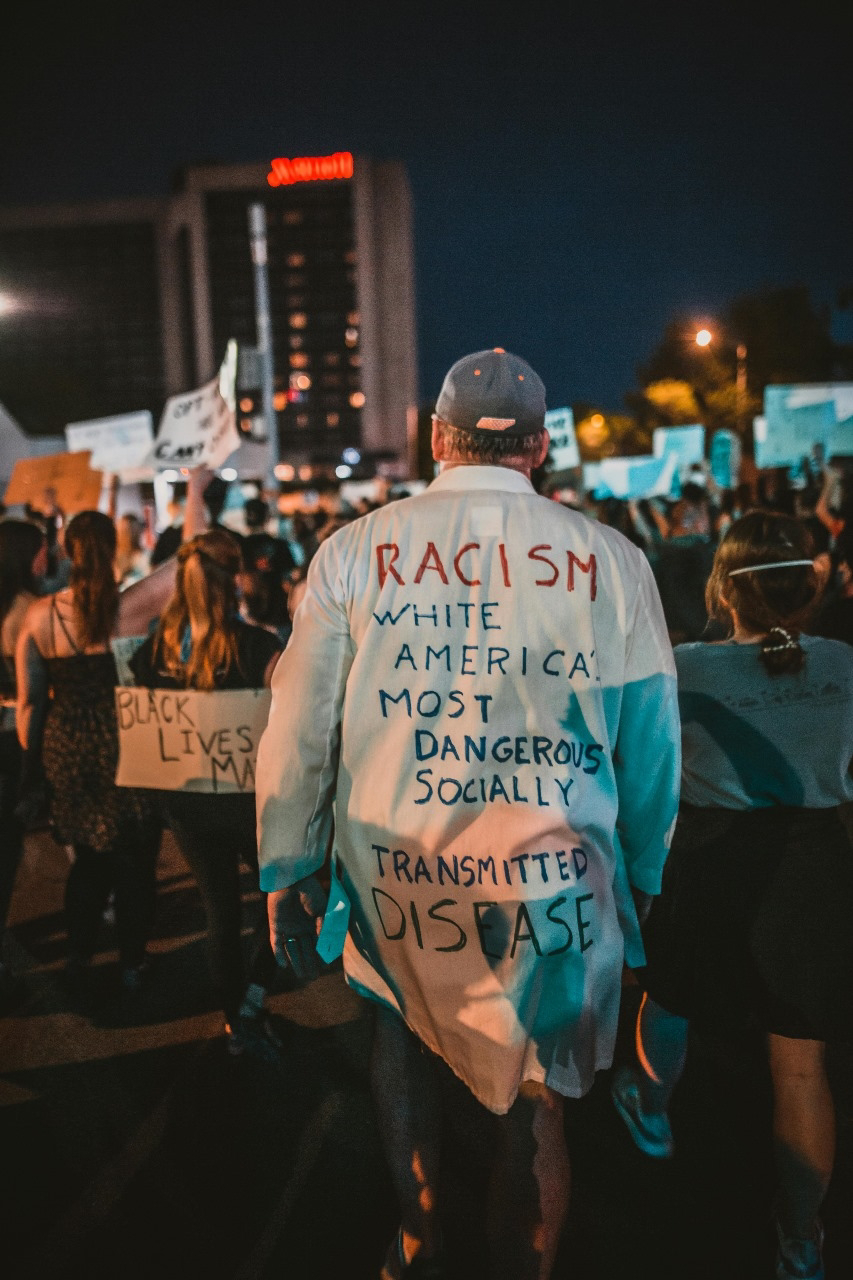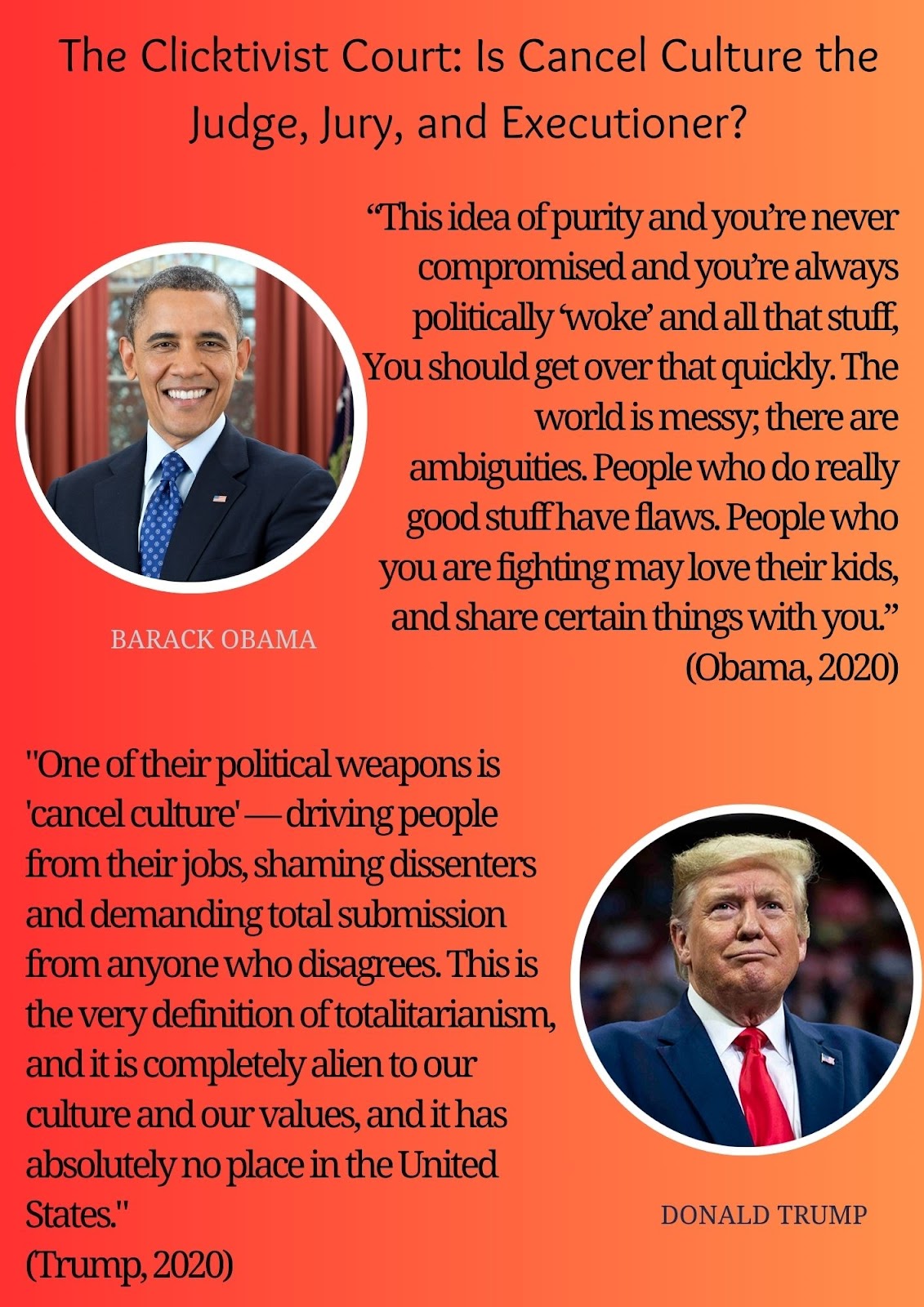“Sticks and stones may break my bones, but words can never hurt me”. That's an old saying some of us have heard for years, but our words are genuinely powerful today. If you are not careful, one wrong word or move could get you cancelled. In the age of digital technology, past and present events are accessible at any time with a click. It has always been a challenging time to summon groups of people to join the public fray to challenge others online for past words or actions. In the digital age, past actions regarded as incongruent with current norms are subject to criticism and rebuke. This phenomenon is now commonly called “cancel culture,” a strategy by groups of individuals using social pressure to shun a target accused of offensive words or deeds. The concept of cancel culture lacks a universally agreed-upon definition. Most definitions centre around themes of accountability but diverge regarding their impact.
Cancel culture is a blend of fun and fury that exposes a new form of social justice, where public ridicule becomes a weapon against injustice, raising questions about its significance and potential pitfalls. The phrase "cancel culture" first appeared in African-American Vernacular English (AAVE) in the 1980s, with the song "Your Love Is Cancelled," which represented a personal decision to withdraw support. By 2015, it had become standard on Black Twitter, indicating a choice to cease supporting a person or work. Cancel Culture has subsequently become connected with movements such as #MeToo and Black Lives Matter, which encourage people to speak up against abusers and racial injustices. However, with the development of internet shaming occurrences, the term's meaning has expanded to include broad public criticism of alleged transgressions, frequently motivated by "mob mentality." The phrase has also become politicised, with opposing viewpoints on its connotations.
The upcoming essay will examine Cancel Culture and how it empowers the typical individual on social media by allowing them to hold famous personalities accountable for destructive
conduct. Furthermore, the investigation will show how Cancel Culture links the social elite and marginalised people, resolving power disparities. However, this piece will critically investigate how Cancel Culture sometimes ignores facts and logic, instead relying on social media fury and mob mentality, perhaps resulting in injustices for the persons under inspection. Does cancel culture represent a powerful tool for social justice or a dangerous descent into online mob rule? This blog explores this complex question...
Public figures often faced few consequences for inappropriate behaviour in the pre-digital era due to traditional media's control over information flows. Traditional media gatekeepers controlled the flow of information, and the voices of ordinary citizens were less likely to be heard. However, the rise of social media has fundamentally reshaped this dynamic. Cancel culture represents a democratisation of cultural criticism and accountability. It empowers the average person on social media by providing a platform to hold public figures accountable for harmful or offensive actions. This phenomenon allows individuals to call out inappropriate behaviour collectively. It serves as a tool for raising awareness about societal injustices andadvocating for accountability among those in positions of power. As media scholar AmandaBrennan notes, "Cancel culture is a manifestation of the public's newfound editorial influence in the age of viral content sharing and decreased gatekeeping." The grassroots nature of these call-outs derives its authority not from established hierarchies but from the sheer numbers of individual voices uniting around a unified message. Ethical voices across disciplines highlight how cancel campaigns allow marginalised groups to counter institutionalised blind spots and biases baked into legacy taste-making institutions. According to cultural critic Steven Petrow, cancel culture "has become an important tool for the traditionally voiceless to be heard and to demand accountability from the powerful who have long ignored or stereotyped them."
Furthermore, the public nature of cancel culture serves as a barrier, encouraging public figures to be more mindful of their words and actions. The threat of widespread condemnation and potential professional or social exile can compel influential figures to be more accountable and considerate in their conduct, ultimately fostering a more ethical and responsible public discourse. While imperfect, this shifting balance of power compels public figures to be more socially conscious and reckon with perspectives too often dismissed throughout history.
While some regard cancel culture as a democratising force, its impact on social inequality is more complex. It undoubtedly promotes a sense of community and supports disadvantaged voices. Social media platforms are an excellent weapon for marginalised communities, traditionally denied access to mainstream media. These organisations can utilise cancel culture to question the established quo and hold influential figures responsible (Bouvier & Machin, 2021; Florini, 2014). Platforms like Twitter enable a "speaking back" mechanism, allowing disadvantaged voices to dispute dominant narratives and support social justice movements such as ‘Black Lives Matter’ and ‘#MeToo’.
Traditional bastions of power have long been biassed, with mainstream media, government, education, and entertainment marginalising views outside of a specific demography. However, cancel culture can act as a corrective factor. According to Osita Nwanevu of The New Republic, a new generation of young progressives, minorities, and women is pushing cancellation efforts to make others accountable for long-ignored abuses. According to Pew Research Centre data for 2021, an overwhelming 71% of cancellation efforts target prominentpersonalities for racist, sexist, or other discriminating behaviour, exposing and destroying pedestals wrongfully granted to essential persons who harm. This collective rage compels a long-overdue reckoning, as highlighted by feminist scholar Jenna Wortham, resulting in substantive reforms such as policy overhauls, harsher penalties, and more victim-centric processes in organisations following the cancellations of figures such as Harvey Weinstein, as documented by Rodgers in 2022. Cancel culture removes outdated traditions that unfairly emphasise elite perspectives, allowing for excellent representation and accountability, as defined by Lisa Nakamura and reflected in more varied activities in educational institutions, as proven by Schmidt in 2020. While contentious, eliminating structural prejudices through public pressure leads to genuine improvements that make society more equitable. However, cancel culture's complex influence on societal differences must be addressed. According to the Foundation for Individual Rights in Education (FIRE), over 60% of Americans believe that cancel culture is a danger to free expression, citing worries about self-censorship and the chilling impact of public rejection on open discourse.
Furthermore, The Atlantic and the New York Post highlight the intricacies and possible pitfalls of cancel culture, such as stifling free speech, suppressing alternative ideas, and balancing responsibility with safeguarding various perspectives. Academic perspectives vary, with scholars like Lisa Nakamura and Meredith Clark highlighting the potential benefits of cancel culture in amplifying marginalised voices and promoting accountability. At the same time, Eugene Scalia offers a legal perspective asserting its status as protected free speech
under the First Amendment. Thus, cancel culture is a corrective against blind spots and biases within traditional power structures, albeit with nuanced implications that necessitate a balanced approach.
While cancel culture claims to promote accountability and justice, it frequently operates outside of facts and logic, depending primarily on social media indignation and mob mentality. This strategy might result in injustices for individuals who become victims of the cancel culture movement. The disadvantages of cancel culture include the possibility of rash decisions, a lack of due process, and a fair trial for the accused. While cancel culture may be used to promote social progress, its dependence on social media anger and disregard for established norms raises serious questions about fairness and justice. A critical examination reveals how cancel campaigns frequently bypass evidentiary standards and objective reasoning, fueled instead by the accelerant of social media-driven outrage cycles. As President Obama cautioned, this brand of public shaming represents "a rhetoric of purity...that prevents people from drawing fair operating rules that take full context into account" (2020). Former President Donald Trump highlighted how cancel culture "punishes dissenters by ruining careers and reputations," serving as an "ideological colonial weapon" to excise them from society through public shaming (2020). For artists, the stakes are pretty high; prominent comedians such as Dave Chappelle and Chris Rock have testified to the chilling consequences of sharp humour and satire. Aside from the economic consequences, the most significant unfairness of cancel culture is that it condemns individuals to social pariah status due to digital hazing. As Pope Francis puts it, it becomes "a form of ideological colonisation" that erases people's identities (2020). The mob narrative overshadows notions of forgiveness, regret, and restorative justice, rendering the guilty unforgivable and disposable through unduly harsh life sentences. This detachment from essential concepts like due process, proportionality, and kindness distorts modern culture's claimed goals. Cancel culture can create a toxic environment where mere accusations, regardless of veracity, hold the power to destroy reputations and livelihoods—the collateral damage of cancelled careers and the profound impact on the victim's mental well-being. Complex human behaviour is reduced to black-and-white narratives, neglecting factors like personal growth and remorse.
Conclusion:
In conclusion, cancel culture has become a powerful social force in the digital era, wielding empowerment and possible danger. On the one hand, it undoubtedly promotes disadvantagedvoices that existing power systems have previously silenced. Social media platforms enable these voices to be heard, generating a feeling of community and collective action. Nevertheless, there are hazards associated with the mechanisms that support cancel culture. Its dependence on the unpredictable character of social media commotion might result in hasty judgements and a disregard for the law. The mob mentality fostered by online echo chambers creates an atmosphere of intolerance for other viewpoints, which usually triumphs over serious consideration of the facts.
Furthermore, the chilling impact of cancel culture may inhibit free speech and open conversation, impeding the progress it intends to make. We must address the valid concerns that disadvantaged voices raise while protecting the fundamental right to free expression. A paradigm incorporating restorative justice and appropriate repercussions for damaging behaviour may give a more nuanced answer. Establishing an atmosphere that supports rational discussion and appreciating other points of view is essential. We can only fully realise the excellent potential of culture while avoiding its negative aspects by critically engaging in it, ensuring a future where social growth and justice coexist.
References:
https://youtu.be/uwRfZXOETV0?si=MJ-ePAc6VcJe7sVh
https://youtu.be/7CJVB3uoez4?si=z8kzNan9rQdXpia5
https://youtu.be/STHIYh5HIVM?si=bcQdx83VdruLNkLU
https://en.wikipedia.org/wiki/Cancel_culture
5)Ng, E. (2022). Cancel culture: A critical analysis. Springer Nature. (n.d.).
6)Velasco, J. C. (2020). You are cancelled: Virtual collective consciousness and the emergence of cancel culture as ideological purging. Rupkatha Journal on Interdisciplinary Studies in Humanities, 12(5), 1-7. (n.d.).
7)Burmah, L. S. (2021). The Curious Cases of Cancel Culture. (n.d.).
This above article is written by Mr. Piyush Ranjna Prusti, currently pursuing F.Y. B.A in English Hons. at the E.F.L.U, Hyderabad.








Comments
Post a Comment